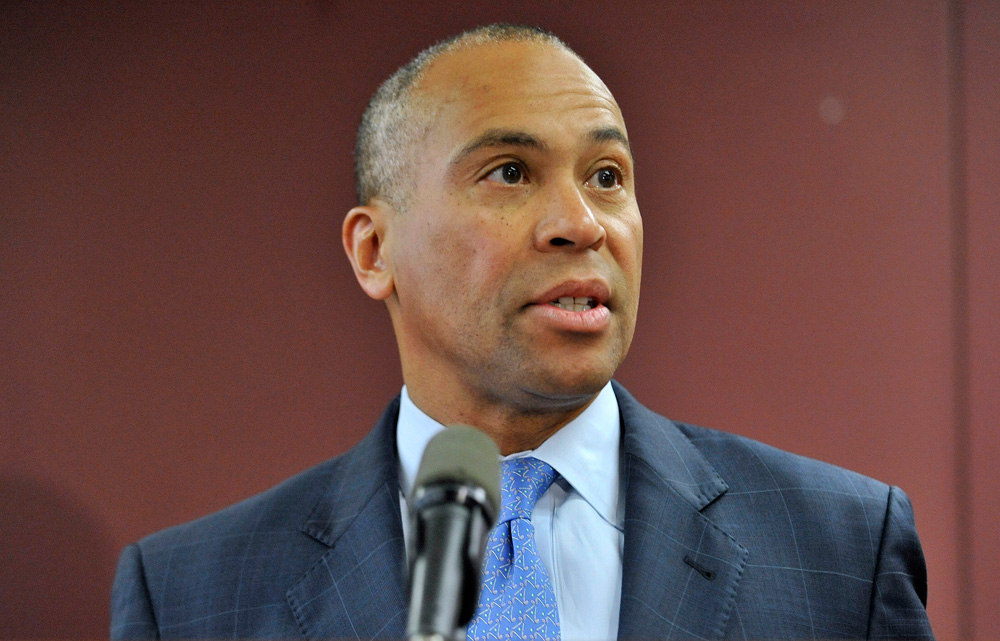Advertisement
Patrick Endorses Plan To Address Opiate Addiction 'Public Health Emergency'
ResumeThe Patrick administration is ready to spend $20 million on two dozen initiatives aimed at curbing a surge in addiction to heroin and other opiates in Massachusetts. The details are in a task force report endorsed by Gov. Deval Patrick Tuesday.
"We have a public health emergency," Patrick said, repeating the reason he created the task force in late March.
To combat that emergency, the state will spend $4 million on new residential treatment programs for adolescents, young adults, families with children, and two that will give priority to Latinos. There’s an enhanced prescription monitoring program. The state plans to spend $3 million on treatment for inmates, including Vivitrol, a drug that blocks the effects of opiates.

The state will also establish regional walk-in assessment centers, "which I thought was one of the more creative findings," said Public Health Commissioner Cheryl Bartlett, who chaired the task force. The centers will be staffed by professionals who can assess anyone who stops by and offer ongoing support groups.
Anyone who decides to check into a detox or rehab program will be able to call a 1-800 number that lists locations statewide with openings, and there are hopes to expand it to throughout New England.
That's critical, said Dr. Paul Jeffrey, director of pharmacy for the Office of Clinical Affairs at UMass Medical School, and a member of the opiate task force.
"There’s a golden moment," Jeffrey explained. "Imagine how frustrating it would be if you made a decision that you wanted to get clean and you couldn’t find a way to do that."
To target young adults with a drug or alcohol problem, the state will add five community-based treatment programs that provide home-based counseling, bringing the total to 12. There is money for a fifth recovery high school — it will be in Worcester — and funding to expand a family support program called Learn to Cope.
Some task force members argue that the most important element would be a statewide education campaign. But Dr. Barbara Herbert, chief of addiction services at St. Elizabeth’s Medical Center, says it will not be the same old "just say no to drugs" approach.
"We have to bring a different critical lens to the kind of education that we do," Herbert said. "Fundamentally this disease is not about drugs, it’s not about substance, it’s about the disease itself. It’s about what’s going on inside people that we need to help heal."
That message of help struck a chord with some of the students at Ostiguy, a recovery high school in Boston where Gov. Patrick released the opiate intervention plan.
"I feel as though people were giving up and trying to just admit defeat, but I’m glad to hear that things are going to be changing, hopefully for the better," said Bill Buell, who was once addicted to painkillers. Buell says his parents' insurance plan would not cover an inpatient program. They placed him in state care so he would qualify for MassHealth, which covered the programs Buell needed.

"My parents had to give up custody for me to get long-term treatment. It was very unconvenient [sic] for me," Buell said.
"I have heard story after story of people who have private insurance being told, 'Get yourself on MassHealth so you can get treated,' I’m done with that, that has to get fixed," Patrick said. "The insurers are going to have to come to the table."
But insurers maintain they were at the table and helped craft the task force recommendations.
"I was really shocked by his comments," said Lora Pellegrini, president of the Massachusetts Association of Health Plans.
Pellegrini acknowledges that there are individual stories, like Buell's, that deserve close attention to find out what happened. She said the goal should be making sure that insurers all cover medical services that work.
"We support working with the Division of Insurance and others to really assess best practices and what constitutes medical necessity. To really come up with best practices makes so much sense," Pellegrini said.
Insurers are also working with the state Senate on an addiction bill that overlaps with much of Gov. Patrick’s approach.
Patrick will try to build a New England-wide plan to curb opiate use when he meets with fellow governors next week. He expects to discuss creating a joint education campaign, sharing open treatment beds, and collaborating to reduce the supply of opiates in the region.
